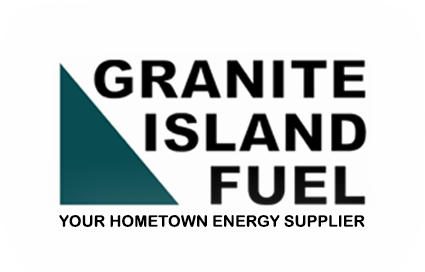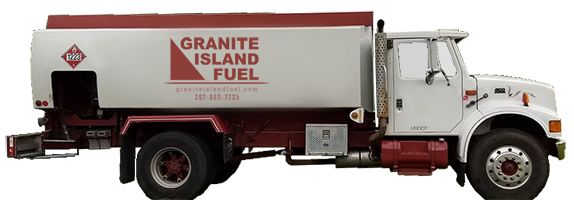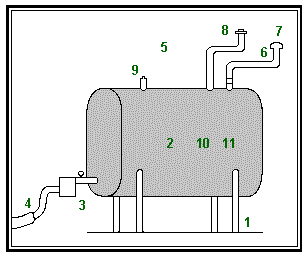MaintenanceEmergency Service |
Is Your Tank In Shape?
As we all know, Maine weather takes its toll, causing ground shifts, frost heaves, rust, and general wear, all of which can affect a heating oil supply tank and its piping. Weather, corrosion, and poor maintenance can lead to spills, smells, leaks, well water contamination, and lower property values. It’s time to see if your tank and piping are in shape. We’ve prepared the following checklist of items that you can easily observe about your oil tank. But remember, look – don’t touch. Even if you can see rust or an oily patch of wetness on the tank’s surface, do not touch your tank. It’s best to call your licensed oil heat technician, and let a professional take care of it. 1 Are the tank legs unstable or on an uneven foundation? [ ]NO [ ]YES 2 Do you see rust, weeps, wet spots, or excessive dents on the tank’s surface? [ ]NO [ ]YES 3 Are there any drips or signs of leakage around the oil filter or valves? [ ]NO [ ]YES 4 Do the oil lines run either under concrete or aboveground without being encased in a protective tubing? [ ]NO [ ]YES 5 Are there any threats of snow or ice falling on the oil tank or the filter? [ ]NO [ ]YES 6 The two main causes of spills come from copper lines leaking under a concrete floor slab and from falling snow and ice damaging fuel filters and outside lines.6 Are there any signs of the tank’s vent being clogged or blocked by ice or snow? (Screened vents are available to prevent insect nest problems.) [ ]NO [ ]YES 7 Is the overfill whistle obstructed, or silent when the tank is being filled? [ ]NO [ ]YES 8 Are there any signs of spills around the fill pipe? [ ]NO [ ]YES 9 Is the tank’s gauge cracked, stuck, or frozen? Do you see oil or staining around it? [ ]NO [ ]YES 10 Is your tank more than 25 years old? [ ]NO [ ]YES 11 Is your outside tank a dark color? [ ]NO [ ]YES If any of your answers to this checklist are YES, please call your licensed oil heat technician for a more detailed inspection and corrective measures.
Maine’s environment and groundwater are so important that new rules have been put in to effect. All buried piping must be replaced by September 1, 2000. All outdoor tanks not meeting the new installation standards must be upgraded by February 2, 2003. Since so many leaks and spills are caused by the corrosion of buried piping and improperly installed outdoor tanks, the Maine Department of Environmental Protection (DEP), Maine’s Oil & Solid Fuel Board, and the Maine Oil Dealers Association (MODA) all agreed that the state regulations needed to be changed. The new rules will keep your heating system running safely and efficiently plus they will protect Maine’s environment. Your local Maine oil dealer and heating contractor are here to help you get your tank in shape. Your licensed oil-burner technician is knowledgeable in oil supply tank construction, installation, and operation. We urge you to take advantage of that expertise to make sure your oil tank, especially if located outside, is stable and in proper working order. There is money available to help with expenses. If getting your tank in shape is going to cost you a lot, then there are financial assistance programs to help. Homeowners who meet low income eligibility requirements can get grants and low interest loans through their Community Action Program (CAP). For others, MODA, the Maine State Housing Authority, and several Maine banks have teamed up to bring you the “Smart Energy” program. It provides loans for oil heating system upgrades. Call the DEP for information on any of these programs. What happens if you have already had a leak? The Groundwater Oil Clean-up Fund has been established to provide insurance for all owners of aboveground tanks that experience any leakage or spills that affect the environment. For more information contact the Department of Public Safety at 624-8734. Please report all spills by calling the DEP’s 24 hour spill hotline at 1-800-482-0777. The sooner you call the sooner we can respond to protect your health, property, and our environment. For more information contact:Maine Oil Dealers Association Maine Oil and Solid Fuel Board Maine Dept. of Environmental Protection |




